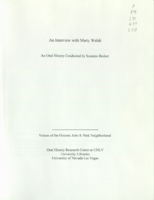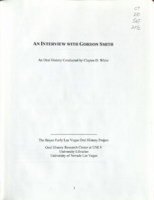Search the Special Collections and Archives Portal
Search Results

Transcript of interview with Elizabeth "Betty" Krolak by Irene Rostine, September 26, 1995
Date
Archival Collection
Description
In 1962, Elizabeth “Betty” Krolak moved from the Midwest to Las Vegas with her husband and six children. Not only would the drier desert climate benefit her youngest daughter’s health due to asthma, but the family hoped the Las Vegas economy would be beneficial for their future. Prior to her arrival in Las Vegas, Betty worked briefly as a secretary for the New York Central Railroad before becoming a stay-at-home mom and active member of the PTA. Upon their arrival in Las Vegas, Betty’s husband enrolled in a real estate class, but was unable to complete the program. Betty, not wanting to waste the $80 they had spent on the class, decided to attend in his place. This decision led to life changing events for Betty and her family over the next four decades. After taking the real estate class and passing the test, Betty became a licensed Nevada real estate broker in October of 1963. She initially went to work for Pyramid Realty and, in 1964, she opened her own office, Clark County Realty. After her divorce in 1967, Betty was left with “six hungry children” to feed and no child support or health insurance. She recalls how the benefits of being in real estate really became apparent during this period of her life. While real estate required long hours seven days a week, it also afforded a single mother flexibility that other careers would not have offered. Likewise, a woman could make more money in real estate in the 1960s and 1970s than most other careers provided, which was particularly important for Betty who was committed to raising her children without public assistance. Betty’s oral history chronicles the growth of the Las Vegas Board of Realtors which has grown into what today is the Greater Las Vegas Association of Realtors (GLVAR). She recalls how, in the 1960s, meetings took place in bowling allies and the primary role of the GLVAR was to provide networking opportunities and represent the Code of Ethics for realtors. However, the Board was dominated by males, with the role of women members confined to planning social events and arranging for refreshments. In 1968, Betty and several other women realtors set out to change this by initially establishing a local Women’s Council within the Board. In the years following, Betty became the first women to be an Executive Board Member. Today, more than half the members of the Executive Board are women. Betty’s oral history also speaks to many changes within the real estate industry over the past four decades, some positive and some not so positive. She recounts the 1960s to the 1980s, when casino workers’ main source of income came from tips which were often unreported, creating challenges in getting casino workers qualified for home loans because they did not have the ability to document their source of income. Likewise, single women had a hard time qualifying for home loans because they only had one income and, in those days, it rarely was enough to qualify for a mortgage on their own. Also during this period, realtors primarily focused on the resale market because builders wanted to work directly with buyers, but changes in the real estate market eventually led builders to realize the benefits of allowing realtors to sell new houses, too. During her career, Betty also experienced the rise of real estate franchises, beginning with Century 21’s arrival in Nevada, the development of Multiple Listing Service (MLS), changes to educational requirements, approaches to settling disputes, and new approaches to ethics violations. Perhaps the biggest change Betty’s oral history speaks to is the personal approach to selling real estate that has been lost over time. In the early days, brokers sold houses right alongside the sales agents. Today, however, regulations have placed brokers in a position where their primary role is to manage sales people, not sell houses. Also, realtors used to interact with other realtors, title company personnel, and mortgage lenders before technology, such as fax machines and computers, came along. In the early days, documents were transferred in person allowing people in the industry to get to know one another through these personal interactions. Today, everything is done electronically and it is rare to actually know the person on the other end. Selling real estate has lost a lot of its personal touch, according to Betty. In addition to being the mother of six children and running one of the largest real estate offices in the area, Betty also found time to give back to the community through her volunteer work with the Salvation Army. She was instrumental in establishing Southern Nevada’s Angel Tree project, which provides Christmas presents to children who otherwise would not receive them. She was also appointed by Governor Michael O’Callahan to the State of Nevada’s Real Estate Commission, making her the first woman to serve on the Commission. Betty’s career in real estate allowed her to witness and implement many changes that still impact the industry today. When Betty began her career, Las Vegas’ population was just over 45 thousand. By the mid-1990s Green Valley, Spring Valley, North Las Vegas, Summerlin, and Sun City had been developed and the Valley’s population exceeded 1 million people. Betty Krolak’s career merged with the real estate boom as she helped find homes for those who wanted to make Las Vegas their home. She made sure the real estate industry’s growth included women, training mechanisms, and ethics which continue to benefit realtors, home buyers, and home sellers to this day.
Text

Transcript of interview with Florence McClure by Joanne Goodwin, January 24, 1996 & February 6, 1996
Date
Archival Collection
Description
Florence McClure came to Las Vegas later in her life, but the state felt her presence and the community her contributions as if she were a native daughter. Introduced to the League of Women Voters in 1967, McClure met her political mentor Jean Ford and learned how to practice the core elements of democracy. She put those tools to work in a number of ways, however her participation in the creation of the Rape Crises Center and her advocacy for locating the women’s prison near Las Vegas are two of her long-lasting efforts. Florence Alberta Schilling was born in southern Illinois where she enjoyed the security of a tight-knit family and the independence to test her abilities growing up. She graduated from high school and attended the MacMurray College for Women at Jacksonville. With the attack on Pearl Harbor in 1941, she began a series of jobs working for the war effort. She moved to Ypsilanti, Michigan with a girlfriend to work at the Willow Run Army Airbase and then moved to Miami, Florida where she worked for the Provost Marshall in the Security and Intelligence Division. She met her husband, James McClure, at the time and they married in 1945. During the next several years, they raised a family and moved around the country and to Japan with the military. McClure came to Las Vegas in 1966 as part of her work in the hotel industry which she engaged in after her husband’s retirement from the military. She had worked in California and Miami Beach, but it was Burton Cohen in Los Angeles who invited her to join him in a move to Las Vegas to build the new Frontier Hotel and Casino. Following the completion of the Frontier, she moved to the Desert Inn with Cohen in 1967 and worked as the executive office manager. After a few years, she decided to leave the industry and complete her college education. She graduated from UNLV in 1971with a BA in Sociology with an emphasis on criminology. She was 50 years old. McClure had been a member of the League of Women Voters for a few years at that point and had learned the political process from Jean Ford and workshops on lobbying. She had numerous skills that were waiting to be tapped when she attended an informational meeting on the incidence of rape in the Las Vegas valley. From that meeting, a small group of individuals, including McClure, began the organization Community Action Against Rape (later renamed the Rape Crisis Center) in 1973. It was the first agency in the area devoted to serving individuals who had been assaulted and changing the laws on rape. The organization’s first office was set up in McClure’s home. Over the next decade, she worked to change attitudes and reshape policy by constantly raising the issues of sexual assault with police officers, emergency room doctors, judges, and legislators. Her role as an advocate took her into hospital emergency rooms and courtrooms to assist victims. It also took her to the state legislator to lobby repeatedly for a change in laws. During this period, journalist Jan Seagrave gave McClure the nickname “Hurricane Florence” - a fitting moniker that captured the force with which McClure attacked the issue. As a result of her efforts and those of the people with whom she worked, we now 1) recognize rape as a crime of assault; 2) forbid the sexual history of a rape victim from being used against her in court; and 3) recognize marital rape. In addition to learning about Florence McClure’s activities, the reader of this interview will gain information on the role of civic organizations like the League of Women Voters in engaging the voluntary efforts of women in the post-war years.
Text

Transcript of interview with Danny Lee by Claytee White and Stefani Evans, May 23, 2016
Date
Archival Collection
Description
Folks who graduated Boulder City High School in 1953 and who began kindergarten there might remember being in kindergarten class with Clark D. "Danny" Lee. They would be excused for not remembering the towheaded Lee; after all, he was in Boulder City only for the first half of the year. They also would be excused for not remembering Lee because he never stayed in school once he arrived. Danny was the child whose mother faithfully brought him to class every day. And every day, as soon as his mother dropped him off, he took off and beat his mother home. Danny Lee was born in his grandparents’ house in North Las Vegas, grew up on 10 Bonneville Street, and (except for his first semester of kindergarten in Boulder City) attended Fifth Street Elementary School and Las Vegas High School, where he graduated in 1953 with Rex Bell. In 1960 he married fellow Las Vegas High grad and former Rhythmette, Dorothy Damron; they have raised four children. Here, Lee talks about the difficulties his father had finding work and supporting a family during the Great Depression-of living with relatives and moving from place to place in the small travel trailer as his father found work. He describes a hardscrabble Las Vegas, where he and other kids in in multiethnic groups found temporary work helping drovers in the stockyards or filling blocks of ice in the icehouse. He recalls working for Superior Tire during high school and for the Union Pacific Railroad in a variety of jobs after graduation and the U.S. Army-including a stint as a Union Pacific tour director. v Lee’s early kindergarten career seems an unlikely academic indicator for a man who would spend most of his adult life volunteering for and lobbying on behalf of Clark County public libraries and who the American Library Association would select as the 1990 Library Trustee of the Year. Ironically, Lee was asked to serve on the Clark County Library District board of directors to get rid of a troublesome library director. Instead, he became one of the director’s staunchest advocates. It is appropriate that Danny and his wife, Dorothy, are pictured here surrounded by library books. The native Las Vegan built a lifetime career as a State Farm Insurance salesman, but in this interview he focuses on his public library advocacy, his time as trustee for the Clark County Library District; the formation of the Las Vegas-Clark County Library District; the ambitious building program funded by $80 million in voter-approved statewide bonds; and the political wrangling in Carson City necessary to achieve these ends. Lee’s oral history complements that of his wife, Dorothy Lee, and of Charles Hunsberger, who was the “troublesome” library director at the time Lee was trustee. Lee made his living as an insurance salesman. Lee’s ability to sell a product-whether it be insurance or an $80 million bond issue-is the attribute that made Danny Lee so valuable as a trustee to the Las Vegas-Clark County Library District and consequently, to all Clark County residents who value public library services. However, his passion, and dedication, and unbowed determination earned him the Library Trustee of the Year award. As Lee closes the interview, he locks eyes with Dorothy and muses, "Let me tell you what I'm most proud of in all . . . I've been married to this lady for fifty six years now. . . . I've lived a very blessed life. Being born in my grandmother's house and having lived in little travel trailers, it's just good. It's worked. We're living like we've always wanted to live right now."
Text

James Dean Leavitt oral history interviews: transcript
Date
Archival Collection
Description
Oral history interviews with James Dean Leavitt conducted by Claytee D. White on September 27 and October 4, 2022 for the Boyer Early Las Vegas Oral History Project. In this interview, Leavitt recalls his role in establishing a medical school at the University of Nevada, Las Vegas (UNLV), now known as Kirk Kerkorian School of Medicine. Leavitt was elected to the Board of Regents in 2004 while Jim Rogers was interim Chancellor of the Nevada System of Higher Education (NSHE), and he suggested the creation of an ad hoc committee Health Science Center Committee. In 2009, Leavitt became Chairman of the Board of Regents, Dan Klaich became Chancellor, and in the following year, Dr. Mark Doubrava joined the board. In May 2014, the planning dean was hired, Dr. Barbara Atkinson, and the UNLV School of Medicine was officially established on August 22, 2014.
Text

Emmy Kasten oral history interview: transcript
Date
Archival Collection
Description
Oral history interview with Emmy Kasten conducted by Kristel Peralta, Ayrton Yamaguchi, and Stefani Evans on March 17, 2021 for Reflections: The Las Vegas Asian American and Pacific Islander Oral History Project. Emmy Kasten discusses her Filipino heritage, her family, and her previous employment working in various industries including acting and broadcasting, marketing, philanthropy, writing, and event production. Emmy shares how she and her husband and children moved to Las Vegas in 2016 after her parents moved to the city a decade earlier, and she discusses her current professional pursuits as a board member of the Miss Asian North America Organization (MANAO) and the Las Vegas Fashion Council. Subjects discussed include: University of California, Irvine (UCI); KTLA Morning News; Red Bull Music Academy; Rock Star Gaming; Filipino foods; Vegas Magazine; and anti-Asian discrimination.
Text

Transcript of interview with Marty Walsh by Suzanne Becker, July 19, 2007
Date
Archival Collection
Description
In 2002, Marty Walsh and her husband purchased a home in the John S. Park Neighborhood. Three aspects attracted them to their 1941-built home: the quality construction; the aesthetics and details of the house; and the "old-fashion human element" that she associated with her grandparents. Marty describes their relocation to Las Vegas after living for nine years in Ireland and her joy of discovering the John S. Park community. For her there is a neighborliness that they found in the form of the Neighborhood Watch. She feels the neighborhood still has work to do, but the gentrification has had splendid results as new "urbanites" replace original homeowners. From her artist point of view, she also provides thoughts about the impact the artist community of musicians, painters, and creative artists has had on the neighborhood. Even though she is relatively new to Las Vegas, she is well researched in the historic aspects of John S. Park location: once a fertile plot of land where
Text

Transcript of interview with Gordon Smith by Claytee White, January 29, 2013
Date
Archival Collection
Description
Gordon Smith was born in Utah, but moved with his family to Babbitt, Nevada in 1947. His father, a barber, moved the family to Las Vegas in 1955. In this interview, Gordon recalls school and after-school pursuits; changes in the town; summer jobs; and college. He also talks about his military service and returning to Las Vegas to take up the razor himself - starting a successful barbering business of over 30 years.
Text

Transcript of interview with Rabbi Sanford Akselrad by Barbara Tabach, October 29, 2014
Date
Archival Collection
Description
Sanford Akselrad is the rabbi at Congregation Ner Tamid. In this interview he describes his rabbinical training, coming to Las Vegas, and the growth of the congregation.
More inclined in his youth to pursue a career as a scientist than rabbi, Sanford Akselrad (1957- ) became the rabbi at Congregation Ner Tamid in 1988. Turning his tenure, Rabbi Akselrad has lead the congregation through its move from Emerson to Street to its permanent home on Green Valley Parkway and I-215 and shares a fun story about buying desks and chairs from the Clark County School District. He talks about many of the milestones including: Project Ezra which he started during the 2008 recession to help Jewish community members find jobs; the NextGen program which was initiated to bring young adults in their twenties and thirties back to the temple. For over twenty years Rabbi Akselrad was a member of the board of the Nevada Governor?s Council on Holocaust education, a topic that was the focus of his rabbinical thesis. He was the founding president of the Clark County Board of Rabbis and has served on the boards of the Jewish Federation of Las Vegas, Jewish Family Services, and the Humana Hospital Pastoral Advisory Board. He was also the chair of the Federation?s Community Relations Council (CRC). Rabbi Akselrad is a board member of the Anti-Defamation League Nevada region office and the Interfaith Council of Southern Nevada. Sanford Akselrad was born on October 6, 1957 in Oakland, California and raised in Palo Alto. He attended the University of California, Los Angeles and then went to graduate school at the Hebrew Union College Jewish Institute of Religion. He spent the first year of his graduate program in Israel, the next two in Los Angeles, and the final two years in Cincinnati, Ohio. Rabbi Akselrad met his wife Joni in Reno, Nevada and married her during his third year of rabbinical school. The couple has two children, CJ and Sam. After his ordination in 1984, Rabbi Akselrad was associate rabbi of Temple Israel in Columbus, Ohio, one of the largest Reform congregations in the Midwest. His choice of career was inspired by his father, Sidney Akselrad, who was a prominent rabbi involved in social justice issues and the Civil Rights Movement. Sanford Akselrad has followed his father?s example of community involvement, both in Las Vegas and on a national level: he served on the board of the National Conference of Community and Justice (NCJJ), he was chair of the NCJJ's Inter-faith Council, and he is active in the Union of Reform Judaism (URJ).
Text

Transcript of interview with Fran Fine-Ventura by Barbara Tabach, March 4, 2015
Date
Archival Collection
Description
In this interview, Fine discusses her childhood as well as the path that led to her career in law, which included working on a presidential campaign in New York City as well as several legal secretary positions in Washington, D.C., Texas and California, before eventually receiving her law degree from Golden Gate University. In addition, she reflects upon working on the infamous Jeff MacDonald murder trial in the 1970s as well as her experience becoming?and ending her service as?a Family Court Judge. Fine also discusses her community service work, particularly with the Women?s Philanthropy Board of the Jewish Federation and with Temple Beth Am.
Frances-Ann "Fran" Fine-Ventura is an attorney at the Fine and Price Law Group in Las Vegas, Nevada. She was born September 28, 1951, in Cleveland, Ohio, and moved to Arizona at the age of eleven when her father sought new economic opportunities out West. Fine eventually moved to Las Vegas shortly after she graduated law school in 1983. Fine worked for the U.S. Attorney's Office in Nevada in the early 1980s, then at several private law firms. From 1992 to 1998, she served as a District Court Judge in the Family Division of the Eighth Judicial District Court. Fine is involved in the Las Vegas community via the Nevada School of the Arts and the Court Appointed Special Advocate (CASA) Foundation in Clark County, Nevada. She has also been involved with the Women's Philanthropy Board of the Jewish Federation of Las Vegas since 1984, and served as chair from 2014 to 2016. Fran Fine's brother is Las Vegas real estate developer Mark Fine. In this interview, Fine discusses her childhood as well as the path that led to her career in law, which included working on a presidential campaign in New York City as well as several legal secretary positions in Washington, D.C., Texas and California, before eventually receiving her law degree from Golden Gate University. In addition, she reflects upon working on the infamous Jeff MacDonald murder trial in the 1970s as well as her experience becoming?and ending her service as?a Family Court Judge. Fine also discusses her community service work, particularly with the Women?s Philanthropy Board of the Jewish Federation and with Temple Beth Am.
Text

Transcript of interview with Gertrude Rudiak by Claytee White, January 11, 2007
Date
Archival Collection
Description
Gertrude (n?e Rightman) Rudiak was born in 1915 in North Dakota to Russian immigrants. She grew up in Wisconsin until 1924. That was the year the family drove to California via the Yellowstone Trail, a dusty, undeveloped road marked by yellow stones. In Los Angeles, her father practiced chiropractic, a holistic approach to well-being for which there was little knowledge at the time. Gertrude earned her music degree at University of California at Berkeley; a decision that did not lead to a career. She then attended a business college and got a job as a social worker in Northern California. In 1941, she met and soon married George Rudiak. It was the advent of World War II. George enlisted in the service and was assigned to Las Vegas Gunnery School (Nellis Air Force Base.) Since he had a law degree from University of California at Berkeley and passed the Nevada Bar exam, he found supplemental employment with local attorneys. Las Vegas became the Rudiaks? permanent home where they raised their five children. In this interview Gertrude recalls the stories of coming to live in Las Vegas of the 1940?s: their phone number was 1-2-3; the neighborhood they lived in longest being Scotch 80s and being part of the secular and Jewish communities.
Text
